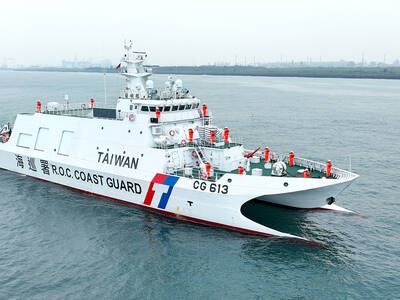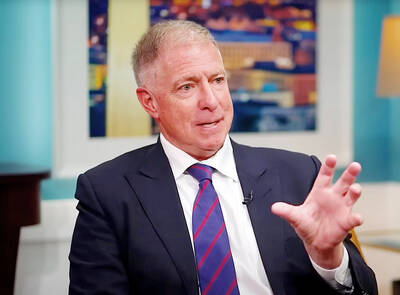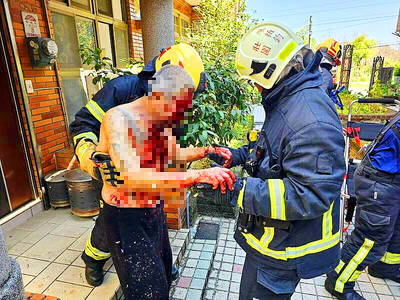Advocacy groups pushing for democracy and media freedom yesterday urged President Ma Ying-jeou (馬英九) to seek a cross-strait agreement on media freedom and called on Beijing to stop censoring news reporting.
The agreement should include protection of the freedom of news gathering, personal safety, news reporting, the Internet, publications, personal actions and no governmental interference in media operations, advocates told a press conference organized by Cross-Strait Agreement Watch (CSAW), Taiwan Democracy Watch (TDW) and the Association of Taiwan Journalists (ATJ).
Safeguarding media freedom has become a salient issue and should be the top priority, because Beijing has repeatedly proposed the establishment of media institutions for Taiwan and China in each other’s territory, TDW convener Hsu Wei-chun (徐偉群) said.
“Taiwan’s media freedom should not be a bargaining chip on the cross-strait negotiation table,” Hsu said.
If Beijing keeps its censorship policy in place, cross-strait media exchanges would be meaningless, because various laws in China contained definite regulations on news censorship, Lai Chung-chiang (賴中強) of CSAW said.
ATJ president Chen Hsiao-yi (陳曉宜) said Beijing regularly grants access to news gathering to selected Taiwanese media, a strategy to control the media which could prevent the truth from being reported, and that was why media institutions across the Strait should not be established before the right to report news is protected.
The Mainland Affairs Council responded to the call in a press release, saying the council has again called on Beijing to respect and protect freedom of the media.
The government has laid out the priority issues in media-related cross-strait exchanges, including ending China’s blocking of Taiwanese news Web sites and an agreement on the publication of Taiwanese magazines in China, it said.

A total lunar eclipse coinciding with the Lantern Festival on March 3 would be Taiwan’s most notable celestial event this year, the Taipei Astronomical Museum said, urging skywatchers not to miss it. There would be four eclipses worldwide this year — two solar eclipses and two lunar eclipses — the museum’s Web site says. Taiwan would be able to observe one of the lunar eclipses in its entirety on March 3. The eclipse would be visible as the moon rises at 5:50pm, already partly shaded by the Earth’s shadow, the museum said. It would peak at about 7:30pm, when the moon would

The Coast Guard Administration (CGA) yesterday held a ceremony marking the delivery of its 11th Anping-class offshore patrol vessel Lanyu (蘭嶼艦), saying it would boost Taiwan’s ability to respond to Beijing’s “gray zone” tactics. Ocean Affairs Council Deputy Minister Chang Chung-Lung (張忠龍) presided over the CGA event in the Port of Kaoshiung. Representatives of the National Security Council also attended the event. Designed for long-range and protracted patrol operations at sea, the Lanyu is a 65.4m-long and 14.8m-wide ship with a top speed of 44 knots (81.5kph) and a cruising range of 2,000 nautical miles (3704km). The vessel is equipped with a

DEFENSE: The US should cancel the US visas or green cards of relatives of KMT and TPP lawmakers who have been blocking the budget, Grant Newsham said A retired US Marine Corps officer has suggested canceling the US green cards and visas of relatives of opposition Taiwanese lawmakers who have been stalling the review of a proposed NT$1.25 trillion (US$39.7 billion) special defense budget. The Executive Yuan has proposed the budget for major weapons purchases over eight years, from this year to 2033. However, opposition lawmakers have refused to review the proposal, demanding that President William Lai (賴清德) first appear before the Legislative Yuan to answer questions about the proposed budget. On Thursday last week, 37 bipartisan US lawmakers sent a letter to Legislative Speaker Han Kuo-yu (韓國瑜), the heads

Two siblings in their 70s were injured yesterday when they opened a parcel and it exploded, police in Yilan said, adding the brother and sister were both in stable condition. The two siblings, surnamed Hung (洪), had received the parcel two days earlier but did not open it until yesterday, the first day of the Lunar New Year holiday in Taiwan, police said. Chen Chin-cheng (陳金城), head of the Yilan County Government Police Bureau, said the package bore no postmark or names and was labeled only with the siblings’ address. Citing the findings of a